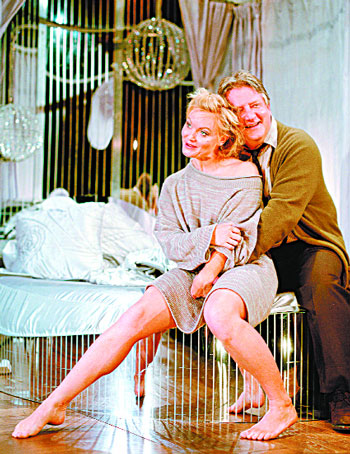Stoppard’s seamless absurdism keeps one on their toes, then their feet
There are many reasons to see the intellectually and theatrically spellbinding new production of Tom Stoppard’s “Jumpers” now delightfully bouncing about the stage at the Brooks Atkinson with unforgettable performances by a magnificent cast. Stoppard’s linguistic antics and director David Levaux’s direction are back at the top of their games.
After the disappointing revival of “Fiddler on the Roof,” Stoppard’s literal and mental gymnastics are once again accessible to even the casual theatergoer.
“Jumpers” demands to be seen for its timeliness. The play deals in morality, the quest for absolutes, and the dramatic tension that is inevitable when what has been “known” and “true” is challenged by new information. At this time, the play brings the arguments over gay marriage to mind, though that certainly was not the playwright’s intent. What happens when the invocation of God comes into direct conflict with civil rights? And, more importantly, what happens when the authority of that God is not accepted or is perceived differently by disparate segments of society? What happens when the old answers do not apply and a person must negotiate between potentially conflicting belief systems? These questions force a reexamination of morality, terrifying for many people to contemplate because the same questions could be applied to any reality.
What is so thrilling about “Jumpers” is that Stoppard asks the questions, but tantalizingly provides no answers. He lays bare the disquieting reality that while we as humans long for absolutes, they are an illusion, and that living (at least doing so as consciously as possible) is a constant balancing act—a kind of non-stop gymnastics, if you will. We each have to find what equilibrium we can.
The story combines this intellectual exploration with music hall routines, academic competition, a murder mystery, a moon landing, and a gymnastics competition. It all works together and makes its own kind of absurdist sense.
George Moore, a philosophy professor, is preparing a speech on God and morality, which he is dictating to his secretary in the office of his apartment. Meanwhile, in the other room, his wife Dorothy (also known as Dottie), a musical comedy star, is having a nervous breakdown because a lunar landing gone wrong has forced her to question what she believed to be true about life. A murder mystery swirls around them involving the slaying of one of George’s colleagues shot while performing gymnastics with fellow faculty members at a party for Dottie. George is the only one of his colleagues who is not also a gymnast, which stands in the way of the promotion he wants.
A doctor, Archie, who also happens to be George’s boss at the college, is treating Dottie with an unorthodox treatment, leading George to conclude that his wife and her doctor are romantically involved. Archie is popular and suave, even if intellectually insubstantial and a sham. Archie’s slickness triumphs over George’s intellect, an unhappy conclusion only mitigated by the hope, at the play’s end, that Dottie, left hanging on a papier maché moon, finds no solace in the answers of either man. All of this unfolds at a breakneck, farcical pace that will keep you engaged, guessing, overwhelmed, and very nearly doubled-over with laughter throughout.
The cast is a dream. Simon Russell Beale gives a touching and intricately rendered performance as George, a man who is wrestling with concepts and realities and who feels totally out of his league. It is the most complete performance by an actor you will see on Broadway right now. Essie Davis as Dottie is alternately fetchingly dim, hilariously funny, and achingly lost. Nicky Henson as Archie is all surface charm and bombast. Nicholas Woodeson as Bones, the detective, is terrific. As a detective, Bones is an interesting counterpoint to the esoteric George, as Bones deals only in the empirical, except when he becomes smitten with Dottie and loses all reason. In the world of “Jumpers,” even the caretaker, Crouch, is an amateur philosopher, played by John Rogan. While mopping floors and changing locks, Crouch demonstrates that, in order to find our way, we all must be philosophers.
George speaks for all of us in his quest for answers, meaning, and an understanding of the forces that drive and shape us. It is a quest, perfectly rendered in this amazing production that keeps us all jumping.



































